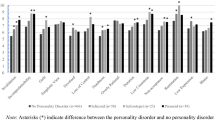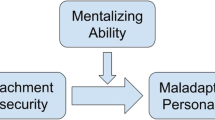Abstract
The current investigation was designed to examine particular maladaptive cognitive schemas as mediating variables of the relationship between the self-defeating personality and depression. A total of 82 mildly to severely depressed adult outpatients, referred for counseling and psychotherapy services, were assessed in terms of self-defeating personality and maladaptive cognitive schema characteristics. Results indicated that 57% of the variance within depression, measured by the Beck Depression Inventory (Beck, Rush, Shaw, & Emery, 1979), was accounted for by the self-defeating personality and five maladaptive cognitive schemas: abandonment/instability; defectiveness/shame; failure; subjugation; and vulnerability to harm. Further, mediation analyses indicated that abandonment/instability and defectiveness/shame statistically mediated the relationship between the self-defeating personality and depression. Results are discussed in light of contemporary theories of depression.
Similar content being viewed by others
REFERENCES
Abramson, L. Y., Alloy, L. B., & Hogan, M. E. (1997). Cognitive/ personality subtypes of depression: Theories in search of disorders. Cognitive Therapy and Research, 21, 247–265.
Abramson, L. Y., Alloy, L. B., Hogan, M. E., Whitehouse, W. G., Donovan, P., Rose, D. T., Panzarella, C., & Raniere, D. (1999). Cognitive vulnerability to depression: Theory and evidence. Journal of Cognitive Psychotherapy, 13, 5–20.
Abramson, L.Y., Metalsky, G. I., & Alloy, L. B. (1989). Hopelessness depression: A theory-based subtype of depression. Psychological Review, 96, 358–372.
Alloy, L. B., Abramson, L. Y., Whitehouse, W. G., Hogan, M. E., Tashman, N. A., Steinberg, D. L., Rose, D. T., & Donovan, P. (1999). Depressogenic cognitive styles: Predictive validity, information processing and personality characteristics, and developmental origins. Behaviour Research and Therapy, 37, 503–531.
Alloy, L. B., Lipman, A, J., & Abramson, L. Y. (1992). Attributional style as a vulnerability factor for depression: Validation by past history of mood disorders. Cognitive Therapy and Research, 16, 391–407.
American Psychiatric Association. (1987). Diagnostic and statistical manual of mental disorders (3rd ed. rev.). Washington, DC: American Psychiatric Association.
Baron, R. M., & Kenny, D. A. (1986). The moderator-mediator variable distinction in social psychological research: Conceptual, strategic, and statistical considerations. Journal of Personality and Social Psychology, 51, 1173–1182.
Beck, A. T. (1964). Thinking and depression: II. Theory and therapy. Archives of General Psychiatry, 10, 561–571.
Beck, A. T. (1967). Depression: Clinical experimental and theoretical aspects. New York: Harper and Row.
Beck, A. T. (1983). Cognitive therapy of depression: New perspectives. In P. J. Clayton & J. E. Barrett (Eds.), Treatment of depression: Old controversies and new approaches (pp. 265–290). New York: Raven Press.
Beck, A. T. (1987). Cognitive models of depression. Journal of Cognitive Psychotherapy, 1, 5–37.
Beck, A. T., Rush, A. J., Shaw, B. F., & Emery, G. (1979). Cognitive therapy of depression. New York: Guilford Press.
Beck, A. T., Steer, R. A., & Garbin, M. G. (1988). Psychometric properties of the Beck Depression Inventory: Twenty-five years of evaluation. Clinical Psychology Review, 8, 77–100.
Beck, J. S. (1995). Cognitive therapy: Basics and beyond. New York: Guilford.
Blatt, S. J., D'Afflitti, J. P., & Quinlan, D. M. (1976). Experiences of depression in normal young adults. Journal of Abnormal Psychology, 85, 383–389.
Blatt, S. J., & Zuroff, D. (1992). Interpersonal relatedness and selfdefinition: Two prototypes for depression. Clinical Psychology Review, 12, 527–562.
Choca, J. P., Shanley, L. A., & Van Denburg, E. (1996). Interpretive guide to the Millon Clinical Multiaxial Inventory (2nd ed.). Washington, DC: American Psychological Association.
Coyne, J. C., & Gotlib, I. H. (1986). Studying the role of cognition in depression:Well-trodden paths and cul-de-sacs. Cognitive Therapy and Research, 10, 695–705.
Derogatis, L. (1983). SCL-90-R administration, scoring and procedures manual-II for the revised version and other instruments of the psychopathology rating scale series. Townson, MD: Clinical Psychometric Research.
Derogatis, L., & Lewis, L. (1994). SCL-90-R, Brief Symptom Inventory, and matching clinical rating scales. In M. E. Maruish (Ed.), The use of psychological testing for treatment planning and outcome assessment (pp. 217–248). Hillsdale, NJ: Erlbaum.
Dyck, M. J., & Agar-Wilson, J. (1997). Cognitive vulnerabilities predict medical outcome in a sample of pain patients. Psychology, Health and Medicine, 2, 41–50.
Dyer, F. J. (1997). Application of the Millon inventories in forensic psychology. In T. Millon (Ed.), The Millon inventories: Clinical and personality assessment (pp. 124–139). New York: Guilford.
Dykman, B. M. (1998). Integrating cognitive and motivational factors in depression: Initial tests of a goal-orientation approach. Journal of Personality and Social Psychology, 74, 139–158.
Fiske, S. T., Kenny, D. A., & Taylor, S. E. (1982). Structural models for the mediation of salience effects on attribution. Journal of Experimental Social Psychology, 18, 105–127.
Flett, G. L., Hewitt, P. L., Blankstein, K. R., & Gray, L. (1998). Psychological distress and the frequency of perfectionistic thinking. Journal of Personality and Social Psychology, 75, 1363–1381.
Franche, R. L., & Dobson, K. S. (1992). Self-criticism and interpersonal dependency as vulnerability to depression. Cognitive Therapy and Research, 16, 419–435.
Gable, S. L., & Nezlek, J. B. (1998). Level and instability of day-today psychological well-being and risk for depression. Journal of Personality and Social Psychology, 74, 129–138.
Glaser, B. A., Campbell, L. F., Calhoun, G. B., Bates, J., M., & Petrocelli, J. V. (2001). Concurrent validity of the Early Maladaptive Schema Questionnaire - Short Form. Manuscript submitted for publication.
Groth-Marnat, G. (1997). Handbook of psychological assessment (3rd ed.). New York: John Wiley.
Holmbeck, G. N. (1997). Toward terminological, conceptual, and statistical clarity in the study of mediators and moderators: Examples from the child-clinical and pediatric psychology literatures. Journal of Consulting and Clinical Psychology, 65, 599–610.
Hyer, L., Brandsma, J., & Boyd, S. (1997). The MCMIs and posttraumatic stress disorder. In T. Millon (Ed.), The Millon inventories: Clinical and personality assessment (pp. 191–216). New York: Guilford.
Kenny, D. A., Kasher, D. A., & Bolger, N. (1998). Data analysis in social psychology. In D. Gilbert, S. T. Fiske, & G. Lindsey (Eds.), Handbook of social psychology (4th ed., Vol. 1, pp. 233–265). New York: McGraw-Hill.
Krueger, R. F., Caspi, A., Moffitt, T. E., Silva, P. A., & McGee, R. (1996). Personality traits are differentially linked to mental disorders: A multitrait-multidiagnosis study of an adolescent birth cohort. Journal of Abnormal Psychology, 105, 299–312.
Lee, C.W., Taylor, G. & Dunn, J. (1999). Factor structure of the schema questionnaire in a large clinical sample. Cognitive Therapy and Research, 23, 441–451.
Maher, B. A., & Maher, W. B. (1994). Personality and psychopathology: A historical perspective. Journal of Abnormal Psychology, 103, 72–77.
McCann, J. T. (1991). Convergent and discriminant validity of the MCMI-II and MMPI personality disorder scales. Psychological Assessment, 3, 9–18.
Meichenbaum, D. (1977). Cognitive-behavior modification: An integrative approach. New York: Plenum.
Millon, T. (1987). Manual for the MCMI-II (2nd ed.). Minneapolis, MN: National Computer Systems.
Millon, T., & Davis, R. D. (1996). Disorders of personality: DSM-IV and beyond. (2nd ed.). New York: Wiley.
Miranda, J., & Gross, J. J. (1997). Cognitive vulnerability, depression, and the mood-state dependent hypothesis: Is out of sight out of mind? Cognition and Emotion, 11, 585–605.
Miranda, J., Persons, J., & Byers, C. (1990). Endorsement of dysfunctional beliefs depends on current mood state. Journal of Abnormal Psychology, 99, 237–241.
Mongrain, M. (1998). Parental representations and support-seeking behaviors related to dependency and self-criticism. Journal of Personality, 66, 151–173.
Mongrain, M., Vettese, L. C., Shuster, B., & Kendal, N. (1998). Perceptual biases, affect, and behavior in the relationships of dependents and self-critics. Journal of Personality and Social Psychology, 75, 230–241.
Mongrain, M., & Zuroff, D. C., (1995). Motivational and affective correlates of dependency and self-criticism. Personality and Individual Differences, 18, 347–354.
Persons, J. B., & Miranda, J. (1992). Cognitive theories of vulnerability to depression: Reconciling negative evidence. Cognitive Therapy & Research, 16, 485–502.
Petrocelli, J. V., Glaser, B. A., Campbell, L. F., Calhoun, G. B., & Bates, J. M. (2001). Clinical syndromes, self-reported symptoms, cognitive schemas, and affectivity of empirically derived personality disorder subtypes. Manuscript submitted for publication.
Retzlaff, P. (Ed.). (1995). Tactical psychotherapy of the personality disorders: An MCMI-III based approach. Needham Heights, MA: Allyn and Bacon.
Retzlaff, P. (1997). The MCMI as a treatment planning tool. In T. Millon (Ed.), The Millon inventories: Clinical and personality assessment (pp. 217–244). New York: Guilford.
Retzlaff, P. D., Lorr, M., Hyer, L., & Ofman, P. (1991). An MCMI-II item-level component analysis: Personality and clinical factors. Journal of Personality Assessment, 57, 323–334.
Schmidt, N. B., Joiner, T. E., Young, J. E., & Telch, M. J. (1995). The Schema Questionnaire: Investigation of psychometric properties and the hierarchical structure of a measure of maladaptive schemas. Cognitive Therapy & Research, 19, 295–321.
Scott, J., Harrington, J., House, R., & Ferrier, I. N. (1996). A preliminary study of the relationship among personality, cognitive vulnerability, symptom profile, and outcome in major depressive disorder. Journal of Nervous and Mental Disease, 184, 503–505.
Sobel, M. E. (1982). Asymptotic confidence intervals for indirect effects in structural equation models. In S. Leinhart (Ed.), Sociological methodology 1982 (pp. 290–312). San Francisco: Jossey-Bass.
Sperry, L. (1999). Cognitive behavior therapy of DSM-IV personality disorders: Highly effective interventions for the most common personality disorders. Philadelphia: Brunner/Mazel.
Trull, T. J., & Sher, K. J. (1994). Relationship between the five-factor model of personality and Axis I disorders in a nonclinical sample. Journal of Abnormal Psychology, 103, 350–360.
Watson, D., Clark, L. A., & Tellegen, A. (1988). Development and validation of brief measures of positive and negative affect: The PANAS scales. Journal of Personality and Social Psychology, 54, 1063–1070.
Welburn, K. R., Coristine, M., Dagg, P., & Pontefract, A. (2000). Schematic change as a result of an intensive group-therapy daytreatment program. Psychotherapy: Theory/Research/Practice/ Training, 37, 189–195.
Wenzlaff, R. M., & Bates, D. E. (1998). Unmasking a cognitive vulnerability to depression: How lapses in mental control reveal depressive thinking. Journal of Personality and Social Psychology, 75, 1559–1571.
Widiger, T. A., Verheul, R., & Brink, W. van den. (1999). Personality and psychopathology. In L. A. Pervin & O. P. John (Eds.), Handbook of personality: Theory and research (pp. 347–366). New York: Guilford.
Young, J. E. (1990). Cognitive therapy for personality disorders: A schema-focused approach. Sarasota, FL: Professional Resource Exchange.
Young, J. E. (1994). Cognitive therapy for personality disorders: A schema-focused approach (2nd ed.). Sarasota, FL: Professional Resource Exchange.
Zuroff, D. C., & de Lorimier, S. (1989). Ideal and actual romantic partners of women varying in dependency and self-criticism. Journal of Personality, 57, 825–846.
Zuroff, D. C., & Fitzpatrick, D. K. (1995). Depressive personality styles: Implications for adult attachment. Personality and Individual Differences, 18, 253–265.
Author information
Authors and Affiliations
Rights and permissions
About this article
Cite this article
Petrocelli, J.V., Glaser, B.A., Calhoun, G.B. et al. Cognitive Schemas as Mediating Variables of the Relationship Between the Self-Defeating Personality and Depression. Journal of Psychopathology and Behavioral Assessment 23, 183–191 (2001). https://doi.org/10.1023/A:1010969321426
Issue Date:
DOI: https://doi.org/10.1023/A:1010969321426




